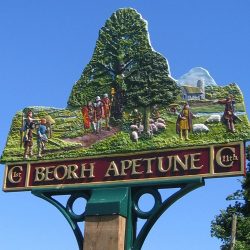Sunday 31 October, All-Hallows Day, the eve of All Saints Day. It will be, as always, the small pleasures that weave brightness into a day. This day dawned into a mist that blots and blurs outlines, blunts sound and smudges the sun to the dull gleam of a well worn sixpence. The last leaves on the bird cherry trees hang limp necked and then, in a stir of air, fall like a shoal of little yellow fish and land as quiet and soft as a hare’s breath. A first flock of fieldfares, the Norse tribes have arrived. In the afternoon, when the sun burned through, my shadow companion’s long legs scissor the path. A charm of King Harrys gather on the feeder. A quiet day cures an overdose of life.
In late afternoon as daylight fades, mist blooms again and melancholy and an unquiet quiet seeps among the shadows, it is Hallowe’en., the time when we pray for deliverance from ghosties, ghoulies and long legged beasties, it is Fright Night! For Celts, it was Samhain, summer’s end, one of their ‘thin’ times, when the veils between the worlds thinned. At dusk, as a half consumed moon rises, the countryside becomes a place of myth and mystery, lanes and lakes, meadow and marsh and unleafed and birdless trees hold an uneasy power and from these are born the songs and stories, rituals and rhymes for the ending of a year. No dreadful American import of Trick or Treat have a place here.
In one of the papers, writers told of their own Fright Night. M.R. James’ stories of a haunted and malevolent countryside, a painting by Ken Currie, films, uncanny clowns with their whitened faces and a piano concerto by Mozart. One writer chose Walter de la Mare’s poem, ‘The Listeners’, she said no matter how many times she read it gooseflesh rose on her arms. Beautifully written and uneasy but far more goosefleshy is the ‘Lyke-Wake Dirge, this is ancient and would probably have been sung by a woman over a dead or dying soul. It is in Yorkshire dialect:
This ae night, this ae night
Every night and all
Fire an’ fleet an’ candleleet
And Christ receive thy soul.’
Listen to the whole song sung on You Tube by ‘Pentangle’. The words are raw-boned, bleak, uncompromising and speak of a harsh and moral law by which to live. The last line becomes a prayer for the dead or dying soul.
Across the North Yorkshire Moors is the Lyke-Wake Walk,a trail of forty miles.
Pat Mlejnecky
p.s.
